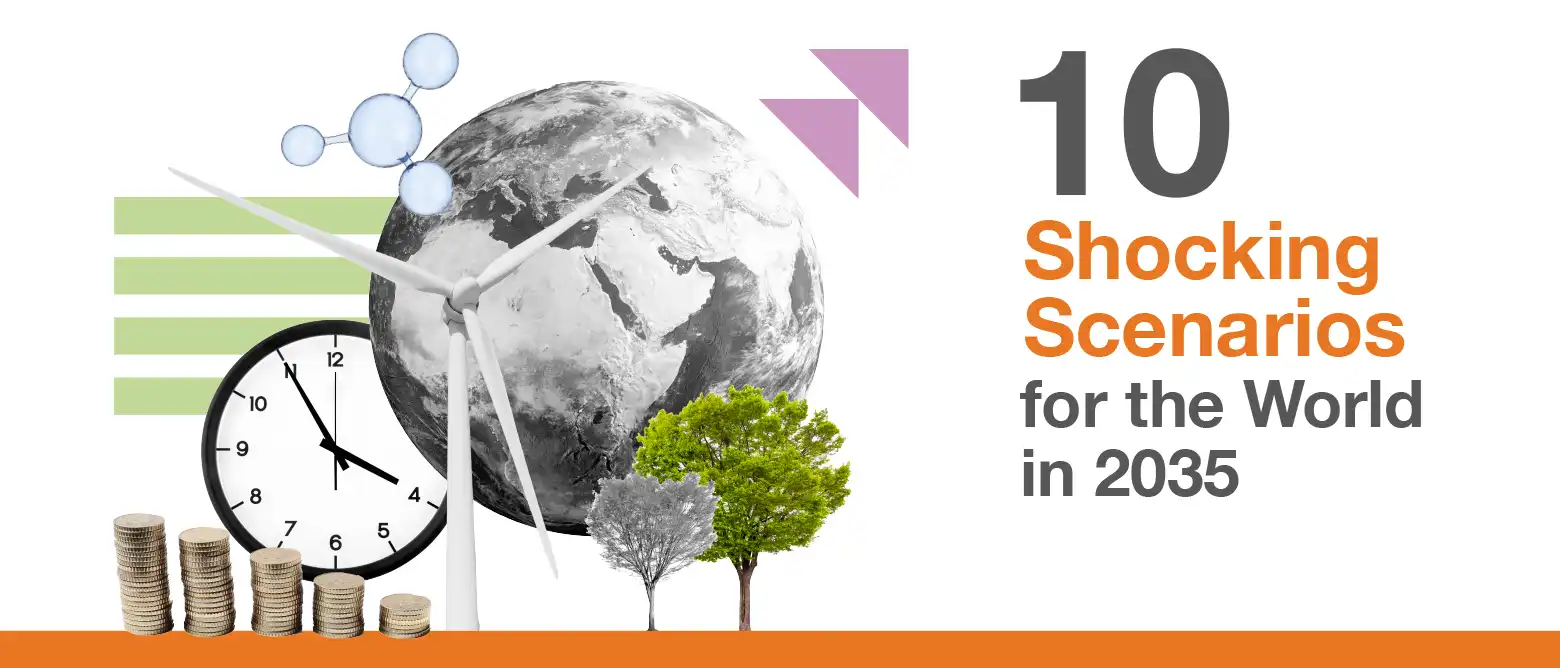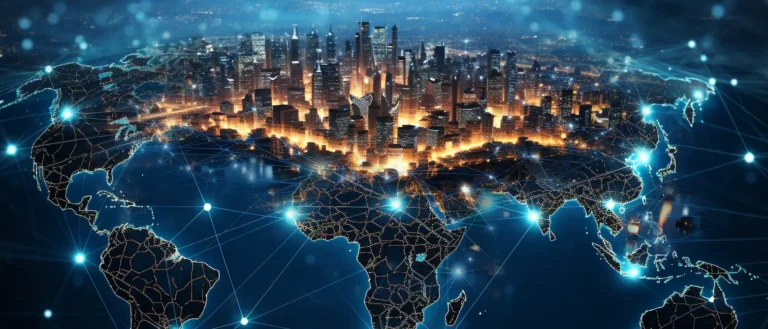The financial sector has made real progress towards being more inclusive, but there is still a significant gap, particularly in leadership roles, that still needs more attention and action initiatives. Institutions that take the lead will not just be doing the right thing; they will gain a competitive advantage.
Dee Dee Sklar
Recently, I was honoured to have been asked by the LMA to deliver the opening keynote for their joint conference with the LSTA in the form of a fireside conversation about shocking scenarios for 2035.
“We all have our time machines, don’t we. Those that take us back are memories…And those that carry us forward, are dreams.”
― H.G. Wells, Science Fiction Writer and perhaps the Grandfather of Futurists.
Futurists are often invited to work with organisations to explore possible, probable and preferable futures as well as potential wild cards, or black swans. In exploring scenarios – using both empirical data and the power of the imagination – decision makers are more prepared for the future. One of the early, and most prominent futurists, was Herman Khan who wrote the book “Thinking About The Unthinkable”, considering what would happen in the event of a nuclear war. However, futurists do not merely predict the future; they also frequently support dreaming and creating preferable futures. They have been quite involved in imagining the post-industrial civilization.
Here are some of the scenarios upon which I touched.
In 2035 a third of Japanese people believe that their personal AIs are sentient. Yes, we survived the Singularity event with the rise of greater than human intelligence as described by science fiction writer Vernor Vinge. He wrote back in 1993 that “It is a point where our models must be discarded and a new reality rules.” Google Futurist Ray Kurzweil also popularised the term with his book “The Singularity is Near.” There were some scary moments during the 2020s: AI did not need to be sentient to kill us! AI either made many mistakes or actually succeeded in goals which were not good for humanity. Deep fakes influenced election outcomes and almost provoked a war with North Korea, just as the nascent Korean reunification process was kicking off. When the Guttenberg press was invented in Europe in the 15th Century, the proliferation of ideas catalysed much instability and war. The advent of the internet and then advanced AI at the beginning of the 21st Century caused a similar amount of instability. But, we made it through that volatile period and global AGI governance has been put into place like the nuclear non-proliferation treaties. Now personal AIs are ubiquitous – people are constantly talking with their AI assistants and outsourcing tasks to them. The “global brain” as imagined by one of my predecessors, HG Wells, is well and truly alive. Our research and understanding of science are accelerating at a breath-taking pace: a Cambrian explosion of ideas and intelligence. The response to every single challenge – or crisis – humanity is facing, can be enhanced with AI – and usually humans working with AI. In fact, AI has catalysed an increase in human intelligence and imagination.
In 2035, President Robert F. Kennedy – starting his second term in the White House announces the closure of another 300 overseas military bases following on to his commitment for the United States to be a bastion of freedom and innovation, but to no longer involve itself in foreign conflict. After the proxy wars and geopolitical fractures of the 2020s, we have transitioned to a multipolar world order. A constitutional crisis and a mild civil war 2.0 nearly split the country. At one point 11 states announced a soft secession, stating that they would not co-operate with the White House on key areas such as immigration and environment. But the Union survived and power moved slightly back to the states and local areas. It turns out that the end of the American Empire was the best thing that could have happened to the USA as its energies turned inward to solving domestic issues and unlocking its immense creativity and innovation. This timeline could be accelerated if chaos this year results in a rejection of the two-party system and a statesman like Robert F Kennedy Jr. wins in the 2024 election. These developments reflect a broader development globally. In fact, the Economist magazine runs a front-page article on the demise of the nation state in 2035: we seem to be in a messy transition to something different. Around the world, cities and even towns have reclaimed power from centralised government. A modern day equivalent of the Hanseatic league in the Medieval age has appeared where groups of cities co-operate on specific issues. Bioregions like Cascadia (spanning the Pacific North West and Canada) co-operate on ecological issues. If the USA does fragment further, these links might become even stronger. A citizen might feel equal belonging to a nation state as well as the group of cities in which he or she belongs.
The demographic time bomb has been detonated and people are awakening to it. The one thing that Elon Musk and Jack Ma agreed upon at an onstage conversation in 2019 was that population decline would become one of the largest challenges for civilization. Forecasters now expect the global population to start declining around 2040, the first time in 700 years. It will never even make it to 9 billion. This will have significant ramifications for nations, societies and communities – especially in the advanced world which is leading the charge. Even Japan has loosened its immigration policies – but it is also studied for its rather innovative ways of dealing with the population fall. It is likely that the advanced nations are now fighting over immigrants, especially ones who have some education. Walls are coming down. Europe, Australasia, Canada, USA, Russia, and East Asia will be desperate for immigration and offering incentives to move.

Climate change and ecosystem collapse will also catalyse mass migration. In 2033, there might be a massive heat wave in India and South East Asia, which causes the deaths of 20 million people. This scenario is spelt out in horrifying detail in Kim Stanley Robinson’s book “Ministry for the Future.” Other less predictable events transpire. Hopefully, the North Atlantic Drift which warms the UK does not stop; this would take the UK from a climate beneficiary to plunging temperatures. The major economies of the world are massively impacted by these scenarios and I cited a paper in Nature. Mass migration becomes one of the great issues of the last decade with climate change events worsening and pushing an exodus from South (places like Central Africa, South East Asia, Latin and Central America) to the advanced nations of the North. Climate sanctuaries – or even superpowers – emerge including Canada, USA, European Alpine nations, Central Asia and even Russia’s arctic areas, which are opening up. Cities we have never heard of might become global names. Some of these shifts are explained in “Move: How Mass Migration Will Reshape the World – and What It Means for You” by a colleague at the World Economic Forum, Parag Khana.
There was a war of inflation (stagflation) against deflation for the last decade to 2035. After inflationary spikes during the 2020s, deflation has won out. The tectonic forces of excess debt, demographics, climate change and food costs and geopolitics are inflationary. It will be costly for the West/NATO countries to extricate themselves from global supply chains with China and Russia: Chimerica – the term coined by historian Niall Ferguson meaning the economic arrangement between the US and China – suppressed inflation in the West for nearly 40 years. The more confrontation there is, the more we err on the side of inflation with explosive moves in energy costs whenever wars or proxy wars break out. At the same time, China is an enormous source of deflation on an unprecedented scale. The factory of the world entered a Japanese style deflationary cycle on steroids and the domestic market could not absorb the production. Many Western nations fought to keep out Chinese products with taxes or dumping bans, but non-aligned countries around the world will take advantage of hugely discounted cars and electronics. Technology – especially AI – is of course deflationary as well. Once peace was established and we made the transition to a new world multipolar order, inflation will shift to deflation as the forces of excess capacity and technology dominate. This timeline might be shortened (as noted above) if statesmen and women are elected to lead Western governments. History has shown that technology is a deflationary force over time. Just observe the data during the British led industrial revolutions: with technology we inherently do more with less.
The USA was the last advanced nation to relinquish GDP as so many people saw the move as a rejection of the American spirit and capitalism. However, governments around the world now use a cockpit of data to measure well-being and progress. Some initiatives were born out of noble intentions to progress our civilization. Other politicians saw their hands forced: it was just not possible to deliver endless GDP growth, but it was possible to improve the lives of citizens. The corporate sector is also now less obsessed with growth and at costs. This might all have an impact on returns in the financial sector – but I do believe that most of you will keep your jobs as we do not entirely abandon markets, even if capitalism morphs into something else.

‘Nature’ is sitting on your board of directors in the form of AI or even an indigenous elder in 2035. Ecocide laws – making mass destruction of nature akin to genocide – are spreading around the world and CEOs have already been jailed in the late 2020s. [Please see an article on the Stop Ecocide website]. The London School of Economics has been renamed to the London School of Ecology and Economics as per the suggestion of activist Satish Kumar. And Denmark is the first country in the world to ban trash. New technologies such as hydrogen are becoming widespread. It is said that we might only be a decade before individual homes might have fusion reactors. After an aberration of several hundred years where our civilization completely went against the principles of nature, we are rapidly moving back into alignment. The shift has been more than large investments into green technologies. Our entire worldview has shifted. IT is said that we are truly at the dawn of an ecological civilization.
Many countries now have a Future Generations Commissioner or even Minister for the Future. Smaller nations like Wales paved the way, but big nations surprised at times. The promotion by the UN, and the appointment of a Commissioner by the EU certainly helped. More than half of large companies now have a Chief Futurist Officer. Short termism – such as 4-year electoral cycles and quarterly cycles – nearly destroyed our societies and planet. We are finally becoming more long term in our governance. The teachings of indigenous societies and their philosophy to look backward and forward 7 generations to give perspective is now common sense around the world.
And finally perhaps one of the most poignant moments in human history….
EI Extra-terrestrial Intelligence might be a more important theme than AI. Last December a friend of mine was involved in passing the US disclosure act. People I meet in national security have taken this seriously off the record for years. This might be one of – if not THE – most important moments in human history – in terms of everything from technology to spirituality – as we begin to communicate with advanced life forms and learn from them.
I think that we are at one of the largest turning points in human history: at least as big as the industrial revolution 300 years ago. But probably as significant as the Agricultural Revolution 10,000 years ago. One might be fearful of the uncertainty ahead. But within this landscape there are plenty of opportunities for investors and decision makers to make wise decisions and, better still, create the future.
Our greatest asset at this poignant moment of history is our imagination.




